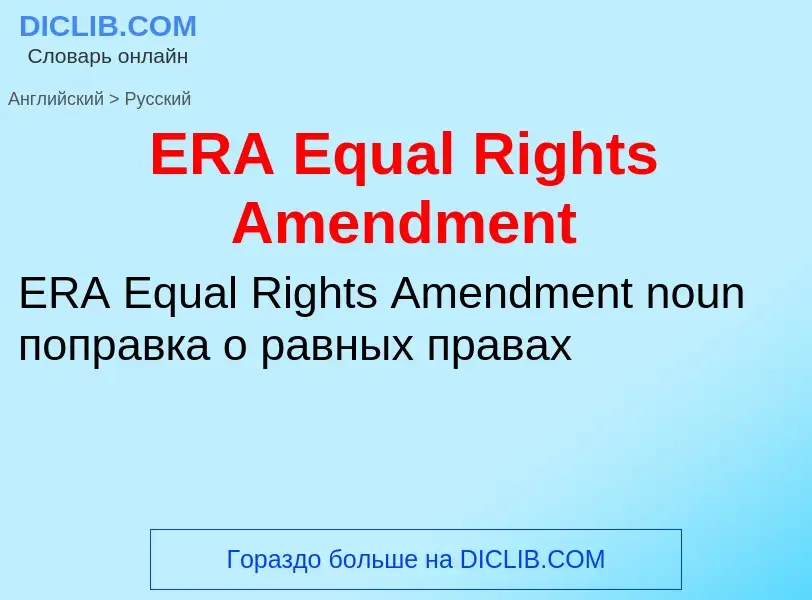Traducción y análisis de palabras por inteligencia artificial ChatGPT
En esta página puede obtener un análisis detallado de una palabra o frase, producido utilizando la mejor tecnología de inteligencia artificial hasta la fecha:
- cómo se usa la palabra
- frecuencia de uso
- se utiliza con más frecuencia en el habla oral o escrita
- opciones de traducción
- ejemplos de uso (varias frases con traducción)
- etimología
ERA Equal Rights Amendment - traducción al Inglés
Definición
Wikipedia
The Equal Rights Amendment (ERA) is a proposed amendment to the United States Constitution designed to guarantee equal legal rights for all American citizens regardless of sex. Proponents assert it would end legal distinctions between men and women in matters of divorce, property, employment, and other matters. The first version of an ERA was written by Alice Paul and Crystal Eastman and introduced in Congress in December 1923.
In the early history of the Equal Rights Amendment, middle-class women were largely supportive, while those speaking for the working class were often opposed, pointing out that employed women needed special protections regarding working conditions and employment hours. With the rise of the women's movement in the United States during the 1960s, the ERA garnered increasing support, and, after being reintroduced by Representative Martha Griffiths in 1971, it was approved by the U.S. House of Representatives on October 12, 1971, and by the U.S. Senate on March 22, 1972, thus submitting the ERA to the state legislatures for ratification, as provided by Article V of the U.S. Constitution.
Congress had originally set a ratification deadline of March 22, 1979, for the state legislatures to consider the ERA. Through 1977, the amendment received 35 of the necessary 38 state ratifications. With wide, bipartisan support (including that of both major political parties, both houses of Congress, and presidents Richard Nixon, Gerald Ford, and Jimmy Carter) the ERA seemed destined for ratification until Phyllis Schlafly mobilized conservative women in opposition. These women argued that the ERA would disadvantage housewives, cause women to be drafted into the military and to lose protections such as alimony, and eliminate the tendency for mothers to obtain custody over their children in divorce cases. Many labor feminists also opposed the ERA on the basis that it would eliminate protections for women in labor law, though over time more and more unions and labor feminist leaders turned toward supporting it.
Five state legislatures (Idaho, Kentucky, Nebraska, Tennessee, and South Dakota) voted to revoke their ERA ratifications. The first four rescinded before the original March 22, 1979 ratification deadline, while the South Dakota legislature did so by voting to sunset its ratification as of that original deadline. It remains an unresolved legal question as to whether a state can revoke its ratification of a federal constitutional amendment.
In 1978, Congress passed (by simple majorities in each house), and President Carter signed, a joint resolution with the intent of extending the ratification deadline to June 30, 1982. Because no additional state legislatures ratified the ERA between March 22, 1979, and June 30, 1982, the validity of that disputed extension was rendered academic. Since 1978, attempts have been made in Congress to extend or remove the deadline.
In the 2010s, due in part to fourth-wave feminism and the Me Too movement, there was a renewed interest in adoption of the ERA. In 2017, Nevada became the first state to ratify the ERA after the expiration of both deadlines, and Illinois followed in 2018. In 2020, Virginia's General Assembly passed a ratification resolution for the ERA, claiming to bring the number of ratifications to 38. However, experts and advocates have acknowledged legal uncertainty about the consequences of the Virginian ratification, due to expired deadlines and five states' revocations.



![U.S. representative [[Martha W. Griffiths]] championed the ERA. U.S. representative [[Martha W. Griffiths]] championed the ERA.](https://commons.wikimedia.org/wiki/Special:FilePath/Martha Griffiths.jpg?width=200)
 Ratification, 10-20-1978.jpg?width=200)
.jpg?width=200)
